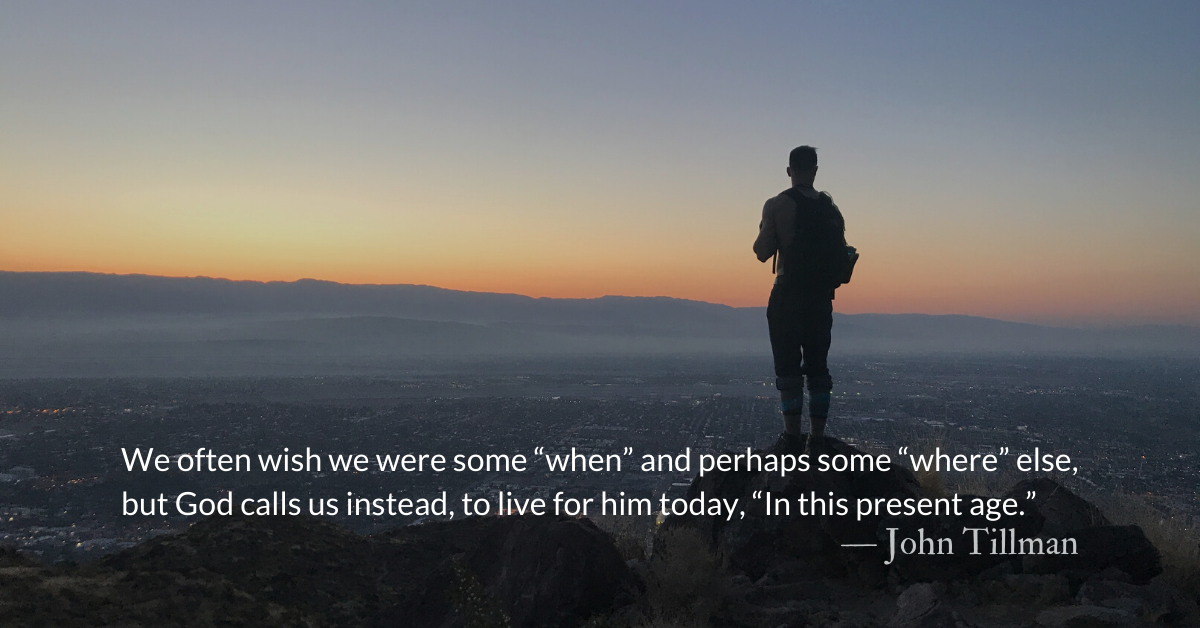Scripture Focus: Titus 2.11-14
11 For the grace of God has appeared that offers salvation to all people. 12 It teaches us to say “No” to ungodliness and worldly passions, and to live self-controlled, upright and godly lives in this present age, 13 while we wait for the blessed hope—the appearing of the glory of our great God and Savior, Jesus Christ, 14 who gave himself for us to redeem us from all wickedness and to purify for himself a people that are his very own, eager to do what is good.
Frodo: I wish none of this had happened.
Gandalf: So do all who live to see such times; but that is not for them to decide. All we have to decide is what to do with the time that is given to us. There are other forces at work in this world, Frodo, besides the will of evil.
Reflection: This Present Age—Guided Prayer
By John Tillman
We often wish we were some “when” and perhaps some “where” else, but God calls us instead, to live for him today, “In this present age.” (Titus 2.13)
There was never an age of this earth in which evil did not wreak havoc, governments did not mishandle justice, and in which the church, in one capacity or another did not fail to fully live out the gospel. Our faith must not be in those things. We join in a prayer today based on what Paul declared the Holy Spirit would teach.
Teach Us, Holy Spirit
Teach us, Holy Spirit, that in this age and in this space, you have placed us and called us.
May we be made eager to do good for the sake of the gospel.
May we all, men and women, live as examples: temperate, worthy of respect, and self-controlled.
May we be sound in our faith and in our love for others, and carry out the work of the gospel.
May we live reverently and truthfully, quenching any spark of slander and never sharing or spreading anything that is not factual.
May we be unfailingly kind and submissive to other another.
May no one be able to malign the word of God because of us.
Teach us by your Holy Spirit to show integrity and seriousness, taking care that no one can mistake or condemn what we say.
May even those who oppose us have nothing bad to say about us.
May we be models of integrity to our employers and fellow-laborers, trustworthy, and immune to corruption.
Teach us to say “no” to desires that are of this world, even ones that seem “good” to human wisdom. Teach us to say “yes” to desires that lead us closer to you, even when they seem “foolish” to human wisdom.
It is no more difficult to live in this age you have placed us in, Lord, than any other age of the church, and probably it is easier. You have placed us here and called us now, to live for you in this place, in this culture, in this time.
Make us ready, Lord, for the challenges that we will face as we await the blessed hope of Jesus Christ, who will redeem us from all wickedness and set right all that is wrong.
Come, Lord Jesus, come!
Divine Hours Prayer: The Request for Presence
For God alone my soul in silence waits; truly, my hope is in him. — Psalm 62.6
Read more about Doing All Things Well
For I know, whate’er befall me,
Jesus doeth all things wel
Read more about Kingdom Manifestation :: A Guided Prayer
Ask God to make you the answer to this prayer. You are called to make manifest the kingdom of God.











